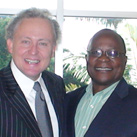The Hallelujah Prayer! Philippians Series #4

“This I pray.” Paul’s prayer is my prayer for us. Prayer is a vital part of the Christian life. If you have not come to understand that as a believer, I hope this chapter will encourage you to become a man or a woman of prayer. Prayer is the lifeline between us and heaven. It is the communication system which keeps us in contact with God in heaven.
 There are no Ph.D.’s in prayer. The disciples said to Jesus, “Lord, teach us to pray.” That is an interesting statement. They didn’t say, “Lord, teach us to preach.” That’s certainly important. They didn’t say, “Lord, teach us to do miracles.” They did do miracles. But they said, “Lord, teach us to pray.” We need to learn how to pray.
There are no Ph.D.’s in prayer. The disciples said to Jesus, “Lord, teach us to pray.” That is an interesting statement. They didn’t say, “Lord, teach us to preach.” That’s certainly important. They didn’t say, “Lord, teach us to do miracles.” They did do miracles. But they said, “Lord, teach us to pray.” We need to learn how to pray.
I am convinced that if we will pray better we will live better. I’m also persuaded that if we pray more we will have more joy. Paul says in Philippians 1:4, “Always in every prayer of mine for you all making requests with joy.” Notice, “Prayer and joy.” I believe we would be happier people if we were more prayerful people. Prayer transforms burdens into blessings. It transforms pains into praises. It transforms griefs into glories.
I don’t know about you, but my experience has been many times that I have gone to my knees in prayer with heavy burdens upon my heart and with sorrow in my heart, but in the course of talking to God in prayer, God has transformed my heartache into glory hallelujah.
This is one of the great prayers of Paul. You will find in the letters of Paul, interspersed in the various discussions which he makes, written prayers. The Holy Spirit has chosen to take these written prayers of Paul and make them a part of Scripture. These prayers have become an illustration to us and a guideline to us of what prayer is all about and how we have our prayers answered.
Paul is bringing us into his prayer closet; it is a sacred place. It shows us the kinds of things that Paul prayed for while he was in prison. What would we find if God brought us into your prayer closet? I have often said that the secret of your success or failure as a Christian will be found in the prayer closet. You are no better than your prayers.
I. We Need To Incorporate The Foundation of Prayer
 It is important that we learn to pray. There are several matters about prayer which are apparent in these verses. As I mentioned earlier, he begins in verse nine by saying, “And this I pray.” We can learn some of the basics of what prayer is all about. We learn that prayer is a personal matter. Paul says, “This I pray.”
It is important that we learn to pray. There are several matters about prayer which are apparent in these verses. As I mentioned earlier, he begins in verse nine by saying, “And this I pray.” We can learn some of the basics of what prayer is all about. We learn that prayer is a personal matter. Paul says, “This I pray.”
Paul was a Pharisee before he was converted. Being a Pharisee, he was one of those who would stand on the street corner, being sure that he had an audience, and then he would say prayers. He would say those prayers in order to impress other people around him what a religious person he was. Do you pray prayers or do you say prayers?
Then, he met Jesus on the Damascus Road. Later, the Lord said to Barnabus, “Go over there and find Paul as he prays.” He had learned to pray! Does God in heaven say about you that you pray? Do you just say prayers or do you pray prayers?
Paul now is a praying man. I am convinced that if you are genuinely a born again believer in the Lord that you pray. We are told by statistics that the majority of people in America pray. But do they say prayers or do they pray prayers?
Someone said many years ago, and I believe it is true, that a prayerless soul is a Christless soul. If you never pray, it makes me wonder if you have truly met Jesus as your personal Savior.
Prayer is personal. It is something that nobody can pray for you. People can make intercession for you. However, they can’t pray the prayer that you are supposed to pray for you. You are the only one who can truly pray the prayers that you need to pray unto the Lord.
The second principle regarding prayer is that it is powerful. You’ve got to get the picture here. Paul, at this particular time when he was writing this letter, is in jail. He has chains on his hands and chains on his feet. He kneels upon a slimy floor in a vermin-filled Roman prison, and he lifts those chained hands toward heaven. When he does, he unleashes a power greater than the power of the Roman legions that marched over the Empire. Satan laughs at our work. He mocks at our thinking, but he trembles at our prayers.
Third, prayer is purposeful. Prayer has a sense of direction to it. A prayer in general never hits anything in particular. We need to learn to put focus to our prayers. We need to get laser beam sharp with our prayers. We need to get very specific and very direct in our prayers.
For instance, when you pray for the lost, what do you pray? Do you just pray for all of the lost people in the world? That’s a wonderful thing to do, but how about focusing that prayer on some lost person you know by name. Do you have a prayer list? Paul had a prayer list. As you read the letters of Paul, you will find that he mentions all kinds of people. Do you put down the names of people you are praying for? Do you put down things that you are praying for? If you don’t have a list or something, how do you ever know God answers a prayer if you don’t know what you’ve prayed or what you are praying for?
II. We Need To Include The Formula Of Prayer
 What in particular does Paul pray for in these verses? I don’t know about you, but if I were in jail and if the conditions were as bad as they say they were in the jails of that day, I can imagine that a whole lot of my praying would be, “Oh, Lord, please get me out of this miserable place. I can’t stand it much longer. Lord, this food is awful. Please get me out where I can at least have a good McDonald’s meal. This is awful! Do something for me.”
What in particular does Paul pray for in these verses? I don’t know about you, but if I were in jail and if the conditions were as bad as they say they were in the jails of that day, I can imagine that a whole lot of my praying would be, “Oh, Lord, please get me out of this miserable place. I can’t stand it much longer. Lord, this food is awful. Please get me out where I can at least have a good McDonald’s meal. This is awful! Do something for me.”
Yet, when you read Paul’s prayer, you will find, “And this I pray, that your love may abound yet more (Phil. 1:9).” Then, we read, “That ye may approve things that are excellent; that ye may be sincere” (Phil. 1:10). He’s praying for them.
One of the great privileges you and I have is the privilege of praying for other people. You’ll never know what it means for someone to say, “James, I’m praying for you.” It is a wonderful thing when I get a letter in the mail, and they say, “James, we want you to know that we are praying for you.” What a privilege to know that someone else is praying for you. What a privilege for you to be able to pray for someone else.
Paul is praying not for himself. There is a place to pray for yourself. But Paul is praying for other people and he gets very specific in prayer. These are not always the things that we pray for other people because I remind you again that this prayer has been elevated by the Holy Spirit so that the prayer not only went to the Philippian believers, but by the Holy Spirit the prayer goes to every believer everywhere. We are reading this today and these are the things that God desires for us.
I want to show you the things that Paul prays for and they are the things that we should pray for in regards to other Christians.
First, Paul says in verse 9, “And this I pray, that your love may abound yet more and more in knowledge and in all judgment.” He is praying now that they will be a growing Christian.
When you receive Christ as your personal Savior, the Bible says in Romans 5:5, that “the love of God is shed abroad, it is poured out in your hearts, by the Holy Spirit given unto us. God puts His love in our hearts.” If you know Christ as your Savior, God will teach you how to love.
Paul is praying here that your love will be a growing experience. He pictures love here like an overflowing stream, like a bubbling up fountain, like a flowing river. He is saying, “I am praying that your love may abound more and more.” I like the prayer I heard of a believer who prayed one time. He said, “Lord, we can’t hold much but we can overflow a lot.” That’s right.
God can help you to grow in your love for Jesus, to grow in your love for other Christians and to grow in your love for lost people. He says, “I want your love to abound, to flow over more and more.” Yet, notice that he puts some banks on the river of love. He says, “In knowledge and in all judgment,” that is, discernment. Those are the two banks of the river love. If a river gets out of its banks it can be very destructive. We know what happens when floods come. You have to have banks on the river of love.
On the one hand, we need knowledge. We need to study our Bible, to know how to pray and to love people. On the other hand, we need discernment. The word judgment is where we get our word aesthetics, which means good tastes. In other words, it means a depth of insight, understanding.
We have to know how to love. We learn from the Lord that we are to love. Then, we are to learn how to use that love and how to channel it in the right direction. For example, a little child loves cats, and the inclination of the child is to reach out and put its arms around the cat. But tigers are in the cat family too. We need to learn to use some discernment. We need to learn to keep love in its proper bounds. The Lord would have us pray that we would be a growing Christian.
Secondly, Paul is praying we will be a genuine Christian. I want you to be the real deal. He prays in verse 10, “That ye may approve things that are excellent; that ye may be sincere and without offense.” “Approve things that are excellent,” means to put to the test the things that are different. In other words, be genuine in your choices in life.
Life is a series of choices, and not all things are equal. He says, “I’m praying that you will try the things that are different, that you will put them to test so that you will be able to approve those best things and discard those things that are not best.” God wants us to learn to make a differentiation between the bad and the good, the good and the better, and the better and the best. Are you choosing the best things in your life?
 Sometimes people are wrapped up with things that do not matter. At times, our sense of values are out of perspective; we lose a sense of balance. For example, in our American culture, we lose our sense of values. I have friends in a poverty nation, who seemingly get more done with less. We have more but do little; they have little and do more. We pay our entertainers and sports personalities millions of dollars each year, while our missionaries at times risk all for the Gospel and get paid so little. Something’s not right there. Somehow, we haven’t learned to put to the test the things that matter the most.
Sometimes people are wrapped up with things that do not matter. At times, our sense of values are out of perspective; we lose a sense of balance. For example, in our American culture, we lose our sense of values. I have friends in a poverty nation, who seemingly get more done with less. We have more but do little; they have little and do more. We pay our entertainers and sports personalities millions of dollars each year, while our missionaries at times risk all for the Gospel and get paid so little. Something’s not right there. Somehow, we haven’t learned to put to the test the things that matter the most.
The same measurement is true in our lives. We need to learn to make discernment in our day to day lives. There are some books that are just not worth reading. Why fill your mind up with it? There are some places that just aren’t worth going to. There are some people that just aren’t worth spending your time with. There are some activities that you are wasting your time with. Learn as a Christian to be genuine in your choices, to choose the best things, the most important things in life.
Next, Paul says to be sincere and without offense, to be genuine in your character. The English word sincere comes from two Latin words, “sine cere.” It means “without wax.“
The background of the word, “sincere,” is that there was a time when furniture dealers would prepare a piece of furniture. Yet, there would develop in the grain of the wood, a crack or a depressed place. Not willing to discard it but wanting to sell it, the carpenter would take that crack or depressed place and they would fill it with wax and would lacquer paint it. To the naked eye, you couldn’t tell that there was a flaw there. The person who bought the furniture, over the course of time, would discover that the flawed place, where wax had been filled in, would begin to disintegrate and would begin to come out. The flaw in time would be revealed. Honest furniture dealers started putting a label on their furniture. They would label the furniture “sine cere:” without wax. No hypocrisy about it.
The Greek word for “sincere,” literally means to examine by the sunlight. In other words, you could take a porcelain vase and lift it to the sunlight. If there was no flaw in the vase, the sunlight would reveal that it was a proper piece of pottery. The real word sincere here means “to examine by the sun.”
This is what God is praying for us. God wants us to be genuine Christians. In other words, that our life can be examined by the sunlight of the Lord, that God will look at us and see that we are the real deal. Jesus said, “Those who do truth come to the light.” If your life is genuine and sincere, then you don’t mind when the light is turned upon it.
“Without offense” means no cause for stumbling. The prayer here is that our lives have no cause for stumbling, that there be nothing in our life that would cause anybody else to stumble. My prayer for you, that you be sincere, without wax, examined by the sunlight, without offense, nothing in your life that would cause anybody to be hindered or stumble, until the day of Jesus Christ.
Paul reminds us we should be living with our eyes on the coming of the Lord Jesus. We should live so that if Jesus came today, we would say, “Welcome, Jesus. I’ve been waiting for You. I’ve been living for You, Lord.”
God wants us to be a growing Christian, “That your love may abound.” God wants us to be a genuine Christian, “Sincere and without offense until the day of Jesus Christ.”
Thirdly, Paul wants us to be a good Christian. In Philippians 1:11, we read, “Being filled with fruits of righteousness, which are by Jesus Christ.” “Being filled with the fruits of righteousness.” The picture here is the picture of a fruit tree. He compares the Christian to a tree bearing fruit, “Filled with the fruits of righteousness.” In other words, your life will begin to demonstrate the good things that come when Christ comes to live in your life.
What’s inside of you will ultimately determine what comes out into your daily life. My prayer for you as you read this chapter, is that you will be a fruit bearing Christian.
In John 15, Jesus said, “That you will bear fruit, more fruit, and fruit that remains.” How do you do it? John 15:4, Jesus said, “Abide in me.” When we abide in Jesus, stay in fellowship with Jesus, the Jesus on the inside can begin to produce fruit on the outside. This is the essence of being a good Christian.
III. We Need To Be Inspired With The Faith of Prayer
 I want us to look now at the dynamics of prayer. He says in the last part of Philippians 1:11: “Unto the glory and praise of God.” The goal of prayer is, “Unto the glory and praise of God.” God prays for us that our lives might be unto the glory and the praise of God. In other words, He is praying that we will be inspired by the goal of prayer. He is praying that God might get the attention. “Unto the glory of God.”
I want us to look now at the dynamics of prayer. He says in the last part of Philippians 1:11: “Unto the glory and praise of God.” The goal of prayer is, “Unto the glory and praise of God.” God prays for us that our lives might be unto the glory and the praise of God. In other words, He is praying that we will be inspired by the goal of prayer. He is praying that God might get the attention. “Unto the glory of God.”
Jesus said in Matthew 5:16, “Let your light so shine before men, that they may see your good works, and glorify your Father, who is in heaven.” If we live the way we should live and behave the way we should behave, then God will get the glory. He says that we are to live unto the praise of God, so that God will not only get the attention, but that God will get the adoration. People will praise the Lord because of our life.
What a wonderful prayer warrior Paul is. He wraps his prayer up with the dynamics of prayer. He prays unto the glory and unto the praise of God. Praise is the follow-through of prayer. Praise wraps up our prayer. Praise without prayer is presumption. But on the other hand, prayer without praise is ingratitude. You and I should live our lives and be such a testimony for the Lord Jesus Christ that people might see our lives and God will get the glory and the praise. People should praise God because of our life.
There was an amazing Christian lady whose life was such a testimony that when she died it seemed as if it were just a natural promotion for her into heaven. People wanted to be better people because of her life and wanted to praise the Lord because of her testimony.
Her son was a noted organist. He was very gifted, and he played for the funeral service of his mom. He just put into the music that day all of his emotions, feelings, and gratitude for his sweet, loving Christian mother. Then, when the service was concluded and the casket was being carried up the aisle, suddenly on the organ there burst a full-throated sound of the “Hallelujah Chorus!”
Our prayer should be when the time comes for our translation, we will be unto the glory and the praise of God that people will say, “Hallelujah!”
Back To Blog




